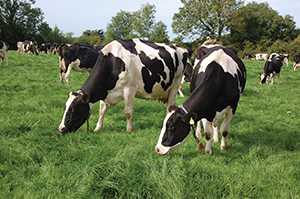New department to be responsible for agriculture and environment
Richard Halleron provides an overview of the responsibilities of the new Department of Agriculture, Environment and Rural Affairs (DAERA) and assesses what its creation may mean for any potential Environment Protection Agency.
 In a move mirroring similar steps already taken by the administrations in Britain and the Republic of Ireland, the Department of Agriculture and Rural Development will, essentially, be merged with the DoE as part of the re-structuring agreed for the Stormont Executive. The new body will be called the Department of Agriculture, Environment and Rural Affairs (DAERA).
In a move mirroring similar steps already taken by the administrations in Britain and the Republic of Ireland, the Department of Agriculture and Rural Development will, essentially, be merged with the DoE as part of the re-structuring agreed for the Stormont Executive. The new body will be called the Department of Agriculture, Environment and Rural Affairs (DAERA).
Significantly, the new department will have no direct responsibility for food, which is the case with the Department of Agriculture, Food and the Marine (DAFM) in the Republic of Ireland and the Department of Food, Environment and Rural Affairs (DEFRA) in England and Wales. However, it will integrate, for the first time, the powers of inspection and statutory implementation, where CAP cross compliance measures are concerned.
DAERA will encompass:
• the existing functions of the current Department of Agriculture and Rural Development (DARD), excluding Rivers Agency;
• environmental functions from the current Department of Environment (DoE);
• inland fisheries from the current Department of Culture, Arts and Leisure (DCAL);
• policy responsibility for sustainable strategy.
The environmental functions transferring from DoE will include regulation, but exclude the Northern Ireland Environment Agency’s built heritage function. Planning matters will not feature within the new department’s remit as these have, for the most part, been devolved to the new local councils. Issues that relate to strategic planning will be transferred from DoE to the new Department for Infrastructure (DfI). It is understood that the Forest Service will be maintained as an agency within the new DAERA.
Streamlining functions
The Ulster Farmers’ Union has indicated to agendaNi that the integration of agriculture and the environment is a big change for the farming industry. It says that, at a superficial level, it is glad ‘agriculture’ comes first in the new department’s names, modelled as it is on DEFRA in England which dropped any reference to farming.
But the Union remains to be convinced that agriculture and the environment are as good a fit as politicians believe. It says it might have been better to combine agriculture with the Enterprise department, given the obvious link between farming and food as the biggest sector of the local economy. However, the UFU welcomes the confirmation that an agricultural specialist, at a senior level, will be part of the new DAERA. It says there are clear potential synergies in combining agriculture and the environment and hopes advantage will be taken of these to streamline the regulatory burden on farmers from DARD and DoE.
The Union also points out that combining the functions in a new department has to weaken the case for an independent environmental agency. It argues such a body would create another level of red tape, when one of the aims of the merger is to reduce bureaucracy and costs in an era when public sector budgets are under pressure.
 A Union spokesperson added: “Farmers are custodians of the countryside and over 70 per cent of the land in Northern Ireland is looked after by farmers. This creates opportunities for farmers to continue delivering environmental benefits. It is important environmentalists work with farmers to deliver more balanced, practical outcomes.
A Union spokesperson added: “Farmers are custodians of the countryside and over 70 per cent of the land in Northern Ireland is looked after by farmers. This creates opportunities for farmers to continue delivering environmental benefits. It is important environmentalists work with farmers to deliver more balanced, practical outcomes.
“We will be monitoring the structure of the new department and our goal will be to ensure that agriculture is never treated as second best in the new structures.”
Environment protection agency
Outgoing farm minister Michelle O’Neill said that both exciting and challenging times lie ahead for Northern Ireland’s agriculture and rural communities. “With the reorganisation into a new broader Department of Agriculture, Environment and Rural Affairs, the Executive aims to provide a more focused and streamlined service to the rural community. While closer alignment will reduce red tape in farming, fisheries and across the environment, supporting rural communities and our agriculture sector will remain at DAERA’s core.
“As the new department is created, there will be a welcome realignment which should allow for improvements in areas such as inspection regimes. While it may take a little time, once the changes have been enacted, there will undoubtedly be greater efficiency.”
However, her outgoing environment colleague Mark H. Durkan does not share such an upbeat perspective. Speaking in the Stormont Assembly last September he said that under the envisaged restructuring arrangements, most of his department’s environmental functions would be inherited by the new DAERA.
He believes that the new arrangements could create conflicts of priorities and responsibilities within the new department, specifically the fudging of his strong commitment to the establishment of an independent environmental protection agency.
“In short, the present arrangements for environmental governance will become even more out of line with what is regarded as good practice in Ireland, Britain and elsewhere in Europe,” said Durkan. “Most of these jurisdictions have some form of independent environmental protection agency.
“Many have expressed support for the creation of some form of agency or body within the public sector, but operating separately from central government to undertake a range of environmental roles and responsibilities. However, it was recognised that, without sufficient support from other political parties, making such changes to our environmental governance arrangements could not be pursued at the time.
“With such large changes to our departmental structures being made in the very near future, I believe that now is the right time to revisit this debate. Ireland’s environment knows no borders, therefore I believe that we should ensure that, at this time of great change, our environmental governance arrangements are well aligned with arrangements in the South. In that way, we would be well positioned to build on the collaborative work already carried out under the auspices of the North South Ministerial Council.
“In my view, an independent, all-island environment protection agency is the best way forward to allow us to develop collaboration and pool resources. I recognise that officials, north and south, have not yet fully considered the implications of an all-island environmental protection agency.”
A key logistical challenge facing the new DAERA will be the very brief settling in period afforded it. This is particularly the case where its agri-related responsibilities are concerned. The coming months had been previously earmarked by Michelle O’Neill as the period during which the key measures agreed for the new Rural Development Programme are to be introduced.





